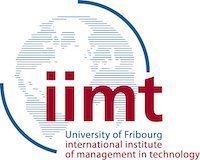The CAS Strategic Management is designed for middle level managers who would like to enhance their knowledge and competence in strategic management taking the challenges of the digital revolution into account.
Application deadline: 22.07.2024
Study start: 02.09.2024
10’800 CHF

The CAS Strategic Management enables you to develop and implement successful business, innovation, marketing, and service strategies. You also learn how the digital revolution challenges traditional business models and offers opportunities for new ones.
Prof. Dr. Stephan Nüesch
Director of the iimt and CAS scientific coordinator
Content
The CAS Strategic Management consists of the following modules and a supervised CAS thesis.
You learn how to achieve a sustainable competitive advantage despite competition or, even better by creating a new market. In doing so, the two best-known strategy approaches are combined: the market-oriented and the resource-oriented view of strategy.
According to the market-oriented view of strategy understanding the competitive landscape is crucial. This involves evaluating competitors’ strengths and weaknesses, identifying market trends, and anticipating changes in consumer preferences.
According to the resource-based view of strategy, a sustained competitive advantage is achieved through strategic resources that are valuable, rare and difficult to imitate or substitute. The resource-based view of strategy also recognizes the importance of a company’s ability to adapt and innovate over time. Organizations must develop dynamic capabilities that enable them to respond to changing market conditions, technological advancements, and evolving customer preferences.
Prof. Dr. Stephan Nüesch
 2 + 3 September 2024
2 + 3 September 2024
In this course you will explore concepts, strategies and tools for the management of innovation and innovative processes and the creation of new business models.
Utilising this tools, you will be able to set up an appropriate innovation strategy, a suitable innovation process including idea generation, idea selection and implementation processes and a fitting innovation culture shaped by an entrepreneurial mindset and agile human resource management practices.
Prof. Dr. Stephan Nüesch and Helia Burgunder
 23 + 24 September 2024
23 + 24 September 2024
The business environment is digital! The growing connectivity of people, machines, and businesses has changed our daily business. In order to keep up and stay competitive, companies must adjust to these demands by digitizing their processes, business models as well as leadership approach. In this course, you will get a digital mindset to embrace innovation and a toolset to bring in fresh ways of thinking.
• Definition, reasons and impacts from digitization to digital transformation
• Major technical developments from big data, artificial intelligence, blockchain, 3D printing etc.
• Digital business models such as network-, service-, data-, platform, metaverse and DAO economy
• Agile and ambidextrous leadership including pragmatic tools to overcome barriers
Dr. Marcus Disselkamp
 28 + 29 October 2024
28 + 29 October 2024
This course highlights the main marketing basics and tools and combines the most recent theoretical know-how with field-tested solutions. The aim is to be able to define marketing objectives and to develop future strategies for success in a global environment.
• Marketing & markets
• Marketing research
• Marketing objectives
• Marketing strategies
Prof. Dr. Sascha Götte
 11 + 12 November 2024
11 + 12 November 2024
This course highlights the transformation in today’s companies towards value creation by smart services. Its aim is to provide you with tools, strategies and business models for a transformation to service-orientation.
• Service-oriented value creation for businesses
• Design of data-based services and service ecosystems
• Rapid service prototyping and testing
• Service processes and service blueprints
• Business models for value creation and value capture with smart services
• Product-service transformation in industrial environments (Industry 4.0)
• Sustainable value creation with smart services
Dr. Jürg Meierhofer
 25 + 26 November 2024
25 + 26 November 2024
The rapid deployment of Artificial Intelligence (AI) is reshaping our society and profoundly impacting businesses. The increasing levels of automation enabled by modern AI open the way to new business models and solutions, but also represent severe societal threats when the “human factors” are not properly handled. This course is devoted to explaining the concepts of AI and HCI (Human-Computer Interaction) and how they can be combined to design human-centered AI systems, i.e., AI systems that augment human abilities instead of restricting or replacing them.
• Introduction to modern AI (Deep Learning, Large Language Models)
• Impact and opportunities of advanced AI in Business (examples of applications, use-cases)
• Introduction to Human-Centered AI (definition, vision, models, and challenges)
• Human-AI interaction and collaboration
Prof. Dr. Philippe Cudré Mauroux
Prof. Dr. Elena Mugellini
 9 December 2024
9 December 2024
You present your project within the class and we conclude with a wrap-up of the lessons learned.
Prof. Dr. Stephan Nüesch
 10 December 2024
10 December 2024
Learn from Industry Experts and Certified Academic Teachers
Facts & Figures
University degree:
Certificate of Advanced Studies (CAS) Strategic Management
Faculty/University:
Faculty of Management, Economics and Social Sciences, University of Fribourg
Prerequisite/Admission:
Bachelor or Master degree from a University or University of Applied Sciences or other diploma recognized as equivalent and three to five years’ work experience. Admission is given “sur dossier”. In justified cases, the study management can admit people who do not or only partially meet individual admission requirements.
Fees:
CHF 10’800
Language:
English
ECTS:
15
Examination:
1 mid-programme examination and 1 final project

If you have any questions, do not hesitate to ask us.
Melissa Rohrer
Head of Executive Programmes & Administration
Tuesday to Friday: 9:00 to 16:00
Phone: +41 26 300 84 28
Email: melissa.rohrer@unifr.ch








